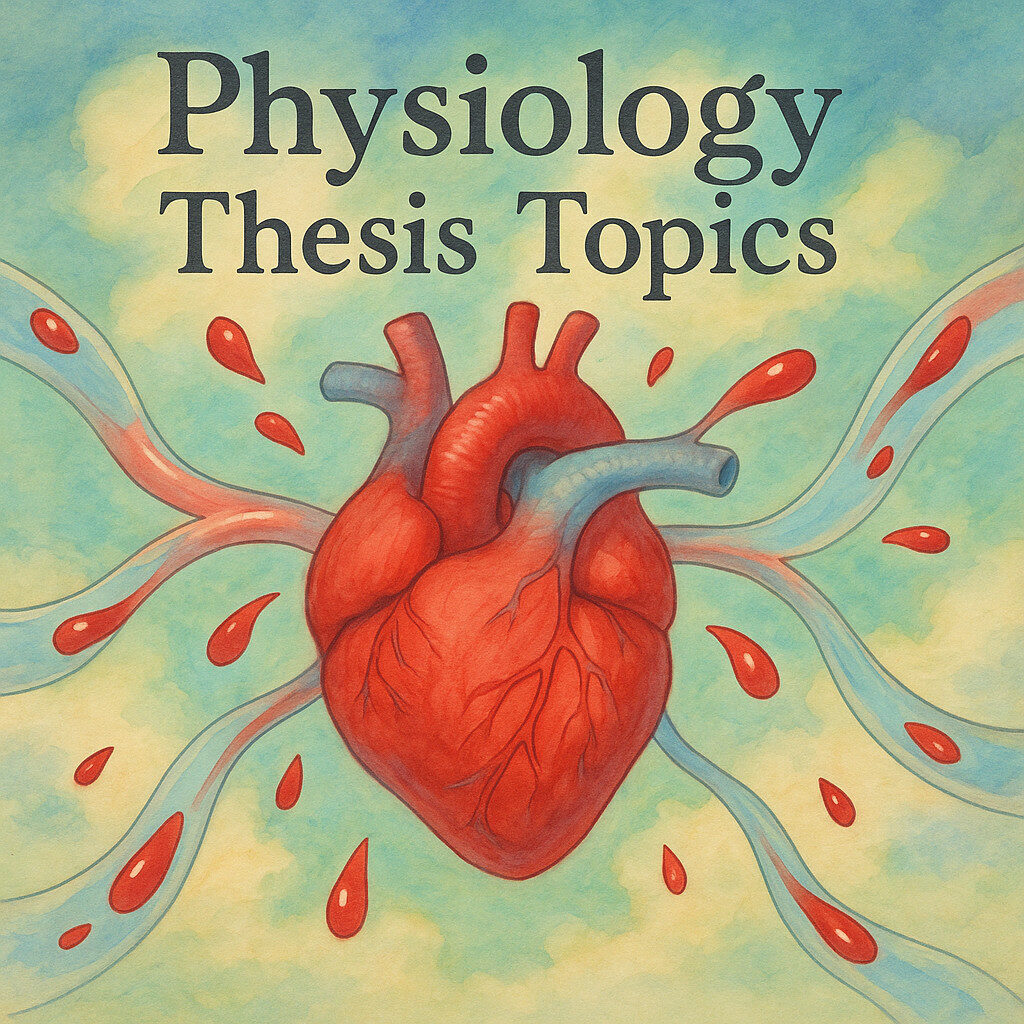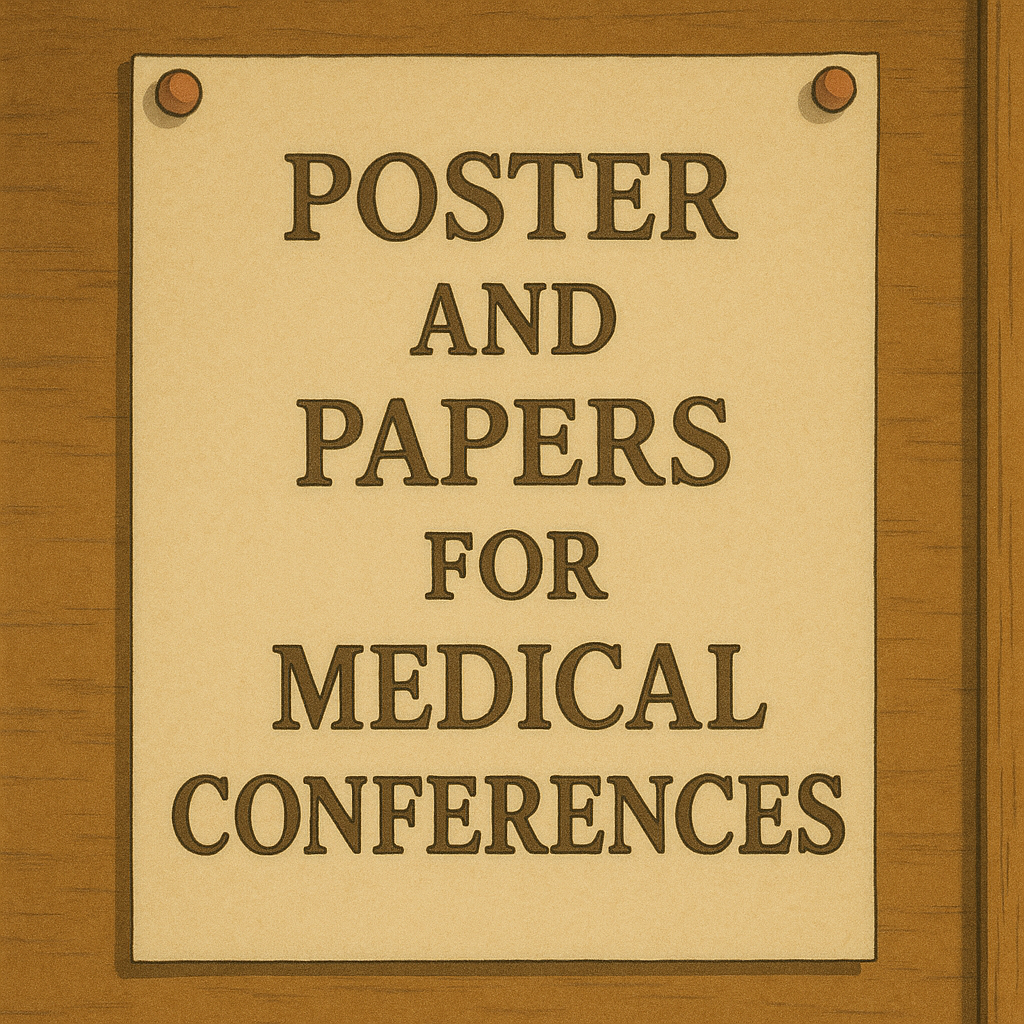PHYSIOLOGY THESIS TOPICS

PHYSIOLOGY THESIS TOPICS
Choosing the right Physiology thesis topics is crucial for laying a strong academic and professional foundation. With over 100+ Physiology thesis topics, students can explore various sections such as cardiovascular physiology, respiratory physiology, neurophysiology, endocrine physiology, and renal physiology. Selecting a relevant and research-worthy topic ensures your thesis is not only educational but also contributes meaningfully to the field. A well-structured thesis based on solid Physiology thesis topics can be refined into a publishable paper in reputed medical journals. This publication is often a mandatory requirement for faculty appointments and career promotions in medical colleges. Thus, thoughtful selection from a wide range of Physiology thesis topics is not just academic—it’s a strategic career move.
1.
Neurophysiology
- A cross-sectional study evaluating auditory
reaction time as a measure of stress-related neural processing in
undergraduate medical students during academic examination periods.
- Comparative analysis of cognitive function using
memory and attention tasks in type 2 diabetes mellitus patients versus
age-matched healthy controls.
- Evaluation of visual evoked potentials (VEPs) as a
diagnostic tool for early cortical changes in patients suffering from
migraine with aura: A case-control study.
- An interventional study on the effects of an 8-week
mindfulness meditation program on autonomic nervous system reactivity and
stress markers in young adults.
- A cross-sectional analysis of sleep quality using
polysomnography and its association with working memory performance among
night-shift industrial workers.
- Brainstem auditory evoked potentials (BAEP) as an
electrophysiological marker of neural conduction deficits in chronic
alcohol-dependent patients: A case-control study.
- Longitudinal study examining the impact of a
12-week aerobic exercise regimen on executive function and working memory
in elderly individuals aged 60–75 years.
- A case-control study of event-related potential
(ERP) changes, particularly P300 latency, in medical students with
internet addiction compared to non-addicted peers.
- Evaluation of electrodermal activity and
sympathetic skin response in patients diagnosed with generalized anxiety
disorder: A neurophysiological case-control study.
- An interventional study on acute autonomic and
neurophysiological responses to psychological stress induced by simulated
patient scenarios in final-year medical interns.
2.
Cardiovascular Physiology
- A cross-sectional study assessing resting heart
rate variability (HRV) in normotensive offspring of hypertensive parents
to determine early autonomic alterations.
- Comparative study of baroreflex sensitivity using
sequence method in obese and non-obese adults aged 20–35 years to evaluate
early cardiovascular dysregulation.
- Effect of 12-week yoga practice on cardiovascular
autonomic reactivity using Ewing’s battery in postmenopausal women: An
interventional study.
- Evaluation of QTc interval duration and variability
in patients with newly diagnosed hypothyroidism compared to healthy
controls: A case-control study.
- Case-control study assessing arterial stiffness
using pulse wave velocity and augmentation index in patients with type 2
diabetes mellitus.
- Comparative evaluation of cardiovascular reactivity
to isometric handgrip test in chronic smokers and age-matched non-smokers:
A cross-sectional study.
- A cross-sectional study investigating gender-based
differences in orthostatic tolerance and blood pressure variability among
healthy young adults.
- A prospective observational study on heart rate
variability fluctuations across the follicular and luteal phases of the
menstrual cycle in healthy females.
- Interventional study on the effects of
high-intensity interval training (HIIT) on resting HRV, baroreflex
sensitivity, and BP in sedentary young males.
- Evaluation of autonomic dysfunction using Valsalva
ratio and HRV in patients with chronic kidney disease stages III and IV: A
case-control study.
3.
Respiratory Physiology
- A cross-sectional study on pulmonary function
parameters in urban traffic police personnel exposed to chronic vehicular
air pollution.
- Effect of a structured yoga breathing program on
respiratory muscle strength and lung function in sedentary office workers:
An interventional study.
- Comparative spirometric evaluation in chronic
smokers and non-smokers aged 30–50 years: A case-control study.
- Study of diurnal variation in peak expiratory flow
rate among healthy adults across different age groups in a tertiary care
setting.
- An interventional study evaluating the effect of
regular pranayama practice on asthma control and quality of life in mild
to moderate asthmatics.
- Pulmonary function test abnormalities in newly
diagnosed hypothyroidism patients: A cross-sectional hospital-based study.
- Cross-sectional study of respiratory parameters in
obese adolescents to assess the impact of increased BMI on lung function.
- Comparative analysis of lung function in users of
biomass fuel versus LPG in rural Indian women: A spirometry-based study.
- Assessment of respiratory muscle strength and
endurance in individuals with sedentary and active lifestyles: A
comparative cross-sectional study.
- An interventional study on the impact of
inspiratory muscle training on pulmonary function and exercise tolerance
in athletes.
4. Renal
Physiology
- Assessment of early renal dysfunction using
microalbuminuria and estimated GFR in first-degree relatives of diabetic
patients: A cross-sectional study.
- Correlation of serum uric acid levels with renal
function and blood pressure in normotensive adults: A hospital-based
cross-sectional study.
- A study of urinary concentrating ability in
patients with chronic analgesic use compared to non-users: A case-control
approach.
- Effect of high-sodium versus low-sodium diet on
renal handling of sodium and blood pressure in healthy volunteers: An
interventional crossover study.
- Evaluation of renal tubular function using urine
osmolality and specific gravity in febrile children with acute infections.
- A comparative study of renal function parameters in
individuals following different hydration practices: A cross-sectional
analysis.
- Prospective study of changes in renal function
markers in pregnant women during different trimesters.
- Study on correlation of serum creatinine and
cystatin-C levels in early detection of renal dysfunction in
hypertensives.
- A case-control study of renal function markers in
normotensive versus hypertensive adolescents.
- Evaluation of estimated glomerular filtration rate
(eGFR) variations in regular gym-goers before and after high-protein
diets: A prospective study.
5.
Endocrine and Metabolic Physiology
- Study of insulin resistance and heart rate
variability in first-degree relatives of patients with type 2 diabetes
mellitus: A case-control approach.
- A cross-sectional study assessing the correlation
between waist circumference and serum leptin levels in young adults.
- Evaluation of thyroid function and resting
metabolic rate in underweight and overweight individuals: A comparative
study.
- Comparative analysis of cortisol response to acute
stress in individuals with and without central obesity.
- A prospective study of glucose tolerance and
hormonal profile during different phases of the menstrual cycle in healthy
women.
- Study of serum adiponectin levels in relation to
body mass index and lipid profile in non-diabetic subjects.
- A case-control study assessing early metabolic
derangements in polycystic ovary syndrome (PCOS) using insulin sensitivity
indices.
- Interventional study on the impact of intermittent
fasting on glucose-insulin homeostasis and lipid metabolism in healthy
adults.
- Comparative study on basal metabolic rate and
thyroid hormone levels in vegetarians versus non-vegetarians.
- Evaluation of hormonal and metabolic responses to
sleep deprivation in medical residents: A prospective observational study.
6.
Environmental and Exercise Physiology
- Comparative study of cardiovascular and thermal
responses to hot and humid environments in manual laborers and office
workers.
- Assessment of physiological adaptation to
high-altitude exposure in military trainees: A longitudinal study.
- Effect of chronic noise exposure on autonomic
function and stress levels among factory workers: A cross-sectional study.
- Interventional study on the impact of moderate
aerobic exercise on oxidative stress markers in middle-aged individuals.
- A prospective study of thermoregulation efficiency
in individuals practicing regular cold water immersion.
- Comparative study of VO₂ max and recovery heart
rate in athletes involved in endurance versus strength training.
- Study of circadian variations in blood pressure and
cortisol in night-shift versus day-shift workers: A cross-sectional
analysis.
- Effect of dehydration on cardiovascular and
cognitive responses during submaximal exercise: A randomized crossover
study.
- A longitudinal study on seasonal variation in
physical performance and respiratory function among outdoor workers.
- Impact of pre-exercise carbohydrate loading on
anaerobic threshold in amateur athletes: An interventional study.
7.
Hematology and Immunophysiology
- Comparative study of hemoglobin and red cell
indices in vegetarian and non-vegetarian female medical students.
- Evaluation of immune response markers (IL-6, TNF-α)
in smokers versus non-smokers: A cross-sectional study.
- A case-control study assessing neutrophil function
in patients with recurrent respiratory infections.
- Interventional study of vitamin D supplementation
on immunomodulation and infection rates in healthcare workers.
- Correlation between lymphocyte subsets and
stress-induced cortisol changes in healthy individuals.
- Assessment of hematological parameters and immune
profiles in yoga practitioners versus sedentary controls.
- Evaluation of platelet function and aggregation in
individuals consuming high-sugar diets: A cross-sectional study.
- Prospective study of hematological changes in
females with iron-deficiency anemia following oral iron therapy.
- Assessment of WBC count variability and immune
stress markers in shift workers: A longitudinal study.
- A study on immune function alterations in patients
with chronic sleep deprivation: A hospital-based case-control study.
8.
Gastrointestinal and Hepatic Physiology
- Comparative study of gastric motility using
electrogastrography in individuals with and without functional dyspepsia.
- A prospective study on liver function tests in
healthy individuals practicing intermittent fasting for religious or
lifestyle reasons.
- Correlation of bowel habits and serum motilin
levels in patients with irritable bowel syndrome: A case-control study.
- Evaluation of autonomic modulation of gut motility
in diabetic versus non-diabetic individuals using HRV and EGG.
- A study on salivary pH and flow rate in medical
students under acute academic stress: A cross-sectional analysis.
- Comparative analysis of liver enzymes and lipid
profile in regular alcohol consumers and abstainers.
- Assessment of gastrointestinal symptoms and
gut-brain axis markers in patients with generalized anxiety disorder: A
case-control study.
- Effect of probiotic supplementation on
gastrointestinal symptoms and fecal pH in adults with functional
constipation: An interventional study.
- Study on correlation between perceived stress and
gastrointestinal symptoms in students: A psychophysiological analysis.
- Evaluation of hepatic function markers in regular
gym-goers consuming protein supplements: A cross-sectional study.
9.
Reproductive Physiology
- Comparative study on reproductive hormone profile
and stress levels in female shift workers versus regular day workers.
- Assessment of semen parameters and testosterone
levels in smokers and non-smokers: A hospital-based case-control study.
- Effect of long-term mobile phone use on
reproductive hormone levels in male students: A cross-sectional analysis.
- Correlation between menstrual irregularities and
serum leptin levels in underweight and overweight adolescent females.
- A study on testosterone levels and muscle mass in
resistance-trained versus sedentary males.
- Evaluation of oxidative stress markers in women
with unexplained infertility: A case-control approach.
- Study of pubertal growth patterns and hormonal
changes in adolescents with early or delayed puberty.
- An interventional study on the impact of yoga
therapy on menstrual regularity and hormone profile in PCOS women.
- Assessment of reproductive hormonal responses to
acute psychological stress in healthy males: A pilot study.
- Comparative evaluation of ovarian reserve markers
in women using hormonal contraceptives and non-users.
10. Recent
Studies in Physiology
- Evaluation of serum irisin levels and their
association with physical activity in Indian adults: A cross-sectional
study based on recent findings in myokine physiology.
- Effect of exogenous melatonin on circadian rhythm
and cognitive function: A randomized controlled trial in medical students.
- Assessment of salivary cortisol awakening response
as a marker of HPA axis activity in individuals with chronic stress: Based
on recent endocrinological insights.
- Study on microvascular endothelial function using
flow-mediated dilatation in prediabetic subjects: Emerging trends in
cardiovascular risk stratification.
- A pilot study on the utility of heart rate
turbulence and deceleration capacity in predicting cardiac autonomic
dysfunction in diabetics.
- Comparative analysis of exhaled nitric oxide in
asthmatic versus non-asthmatic adolescents: A biomarker-based approach.
- An exploratory study on gut microbiota composition
and its physiological correlation with body weight and diet patterns in
Indian adults.
- Impact of blue light exposure on sleep quality and
melatonin secretion: A study based on recent chronobiology research.
- Assessment of muscle oxygenation during resistance
training using near-infrared spectroscopy (NIRS): An emerging
physiological tool.
- A study on the effects of mindfulness-based
interventions on inflammatory markers in healthcare professionals:
Bridging psychoneuroimmunology and practice.



